新概念英语第三册重点学习内容介绍
新概念第三册(全套)课文讲解和笔记
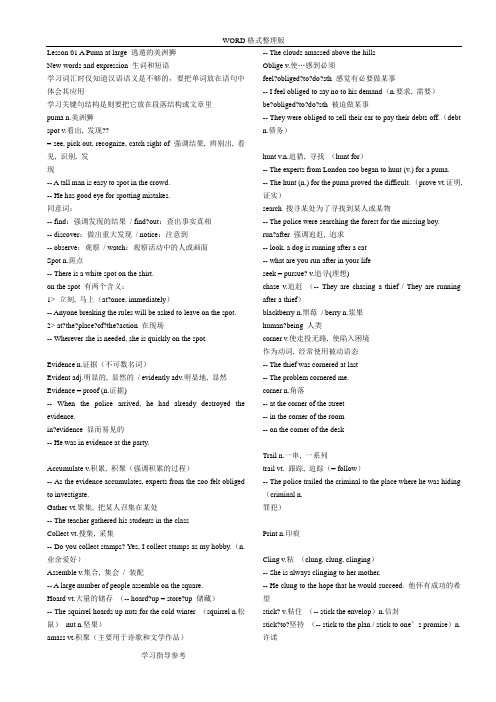
Print n.印痕
Cling v.粘(clung, clung, clinging)
-- She is always clinging to her mother.
-- He clung to the hope that he would succeed.他怀有成功的希望
stick? v.粘住(-- stick the envelop)n.信封
-- look, a dog is running after a cat
-- what are you run after in your life
seek = pursue? v.追寻(理想)
chase v.追赶(-- They are chasing a thief / They are running after a thief)
-- The hunt (n.) for the puma proved the difficult.(prove vt.证明,证实)
search搜寻某处为了寻找到某人或某物
-- The police were searching the forest for the missing boy.
run?after强调追赶,追求
-- I’ll get the book back somehow.无论如何我要把这本书取回来。
-- I got lost somehow不知怎么搞地,我迷失了。
Somewhat adv.稍微,有点,有些(= a little)
-- The price is somewhat higher than I expect.(high adj.高的)
be?obliged?to?do?sth被迫做某事
(完整word版)新概念英语第三册重点学习内容介绍

新概念英语第三册重点学习内容介绍新概念第三册词汇首先呢,我们要做教材当中的内容呢,就是词汇的内容,词汇呢,我们注重的是两块。
一个叫词汇的数量,一个叫词汇的质量。
这个词汇的数量到三册尤为重要,因为二册的话,整个教材词汇加起来可能1000多个词汇.三册也不多,但三册我们需要把词汇量呢,拓展出来,所以我们需要用到构词法这个东西,词根、词缀这个东西.1。
词汇的数量比如说,我们在这个教材当中出现的比如说提到这个resident。
我们第五课提到的这个president,到后面这个第50课提到的assiduous,47课提到的这个insidious。
还有比如说我们会拓展出来的,比如说六级考研词汇当中的dissident,这些词看起来没有什么特别的联系,但是我们仔细分析发现,他们有一个相同的词根,这个词根叫Sid,那么这个词根是什么呢?是Sit,就是坐,坐在这个地方。
所以简单我们把它穿起来之后却发现,resident呢,是re开头的,这个re表示重复、反复.所以反复的到这个地方去坐下去、去休息,就是一个居住的、住所的地方,一个居民。
那president这个pre是之前,所以我一直坐在前排,我是个重要人物的,所以成为大学的校长啊,总统啊,这样的概念。
那么提到assiduous,那么这是表示勤奋的,为什么呢?A加辅音字母我们会经常提到,非常常见的一个前缀,它叫什么呢?叫做增强一个动作,表示这个动作意味的一个增强,没有特殊的含义,所以合到一起的话,就表示我们一直坐在这个地方。
所以我们中国人有句话讲叫能坐得住板凳的这样的人,属于非常辛勤、勤劳的人。
那么到assiduous这个的词,insidious这个in呐,是表示在里面,所以字面上看起来是什么呢?叫坐在其中.所以坐在其中是什么呢?叫暗中危害的。
再比如说dissident,dis相反的,所以坐在两个相反的方向,那就是有不同意见,有不同见解,所以叫有分歧的。
所以我们从词汇的角度,注重的第一层面的问题就是词汇的数量的问题。
新概念第三册全套课文讲解及笔记更改打印版精品资料
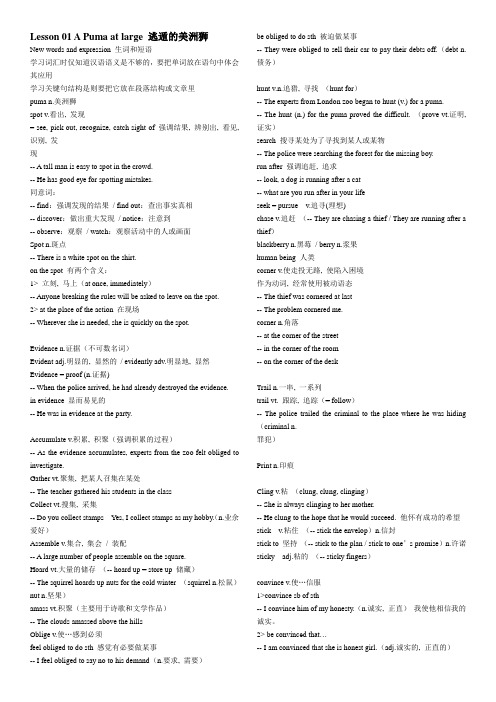
Lesson 01 A Puma at large 逃遁的美洲狮New words and expression 生词和短语学习词汇时仅知道汉语语义是不够的,要把单词放在语句中体会其应用学习关键句结构是则要把它放在段落结构或文章里puma n.美洲狮spot v.看出, 发现= see, pick out, recognize, catch sight of 强调结果, 辨别出, 看见, 识别, 发现-- A tall man is easy to spot in the crowd.-- He has good eye for spotting mistakes.同意词:-- find:强调发现的结果/ find out:查出事实真相-- discover:做出重大发现/ notice:注意到-- observe:观察/ watch:观察活动中的人或画面Spot n.斑点-- There is a white spot on the shirt.on the spot 有两个含义:1> 立刻, 马上(at once, immediately)-- Anyone breaking the rules will be asked to leave on the spot.2> at the place of the action 在现场-- Wherever she is needed, she is quickly on the spot.Evidence n.证据(不可数名词)Evident adj.明显的, 显然的/ evidently adv.明显地, 显然Evidence = proof (n.证据)-- When the police arrived, he had already destroyed the evidence.in evidence 显而易见的-- He was in evidence at the party.Accumulate v.积累, 积聚(强调积累的过程)-- As the evidence accumulates, experts from the zoo felt obliged to investigate.Gather vt.聚集, 把某人召集在某处-- The teacher gathered his students in the classCollect vt.搜集, 采集-- Do you collect stamps Yes, I collect stamps as my hobby.(n.业余爱好)Assemble v.集合, 集会/ 装配-- A large number of people assemble on the square.Hoard vt.大量的储存(-- hoard up = store up 储藏)-- The squirrel hoards up nuts for the cold winter (squirrel n.松鼠)nut n.坚果)amass vt.积聚(主要用于诗歌和文学作品)-- The clouds amassed above the hillsOblige v.使…感到必须feel obliged to do sth 感觉有必要做某事-- I feel obliged to say no to his demand(n.要求, 需要)be obliged to do sth 被迫做某事-- They were obliged to sell their car to pay their debts off.(debt n.债务)hunt v.n.追猎, 寻找(hunt for)-- The experts from London zoo began to hunt (v.) for a puma.-- The hunt (n.) for the puma proved the difficult. (prove vt.证明, 证实)search 搜寻某处为了寻找到某人或某物-- The police were searching the forest for the missing boy.run after 强调追赶, 追求-- look, a dog is running after a cat-- what are you run after in your lifeseek = pursue v.追寻(理想)chase v.追赶(-- They are chasing a thief / They are running after a thief)blackberry n.黑莓/ berry n.浆果human being 人类corner v.使走投无路, 使陷入困境作为动词, 经常使用被动语态-- The thief was cornered at last-- The problem cornered me.corner n.角落-- at the corner of the street-- in the corner of the room-- on the corner of the deskTrail n.一串, 一系列trail vt. 跟踪, 追踪(= follow)-- The police trailed the criminal to the place where he was hiding (criminal n.罪犯)Print n.印痕Cling v.粘(clung, clung, clinging)-- She is always clinging to her mother.-- He clung to the hope that he would succeed. 他怀有成功的希望stick v.粘住(-- stick the envelop)n.信封stick to 坚持(-- stick to the plan / stick to one’s promise)n.许诺sticky adj.粘的(-- sticky fingers)convince v.使…信服1>convince sb of sth-- I convince him of my honesty.(n.诚实, 正直)我使他相信我的诚实。
新概念英语第三册语法详解和总结(带习题)

王牌要点:通常由that或疑问词导出。
1. How some mammals came to live in the sea is not know.〔主语从句〕2. The attorney told his client that they had little chance of winning the case.〔宾语从句〕3. The problem is what we'll do next.〔表语从句〕4. We have no idea that he has come back.〔同位语从句〕同位语〔Appositive〕:同位语是英语语法的重点内容,也是各类考试中的一个考点,同时,在写作中正确运用同位语可以使你的句型更加简洁得体。
新概念英语? 第三册第一课有这样一个句子:When reports came into London zoo that a wild puma had been spotted forty-five miles south of London, they were not taken seriously.45英里在这里,a wild puma had been spotted forty-five miles south of London就是同位语从句,它本来应该放在“reports〞后面,这里却被放在了谓语成分came into London zoo的后面,目的是让句型显得更为稳重。
I.简单记忆:同位语从句,就是对某些名词做进一步的解释的句子。
I was greatly shocked when I heard the news that his father died yesterday.〔that 引导的句子解释了news的内容,注意:that不做任何成分〕We have to face the fact that the weather is unexpectedly bad.〔that 引导的句子解释了fact的内容〕II.联想记忆:[大声朗读三遍,背下即可。
裕兴新概念英语第三册笔记

裕兴新概念英语第三册笔记
以下是一些关于裕兴新概念英语第三册的笔记,供您参考:
1. 主题:本册的主题涵盖了各种日常生活场景,包括旅游、购物、家庭生活、工作等。
2. 语法:本册的语法知识点包括动词时态、被动语态、从句等,帮助学生提高语言表达的准确性和丰富性。
3. 词汇:本册的词汇量有所增加,学生需要掌握更多的常用词汇和短语,以应对更广泛的交流场景。
4. 听力:本册的听力材料多样,包括对话、讲座、新闻等,可以帮助学生提高听力理解和信息捕捉能力。
5. 阅读:本册的阅读材料涵盖了各种文体,包括小说、议论文、说明文等,可以帮助学生提高阅读理解和分析能力。
6. 口语:本册的口语练习场景真实,话题广泛,可以帮助学生提高口语表达和交流能力。
7. 写作:本册的写作练习注重实际应用,包括写信、写邮件、写报告等,可以帮助学生提高写作技能和表达能力。
以上是一些关于裕兴新概念英语第三册的笔记,希望对您有所帮助。
新概念英语第三册+Lesson+1+A+Puma+at+Large课堂笔记讲义

1、Pumas are large, cat-like animals(which are found in America.定语从句)美洲狮是一种体形似猫的大动物,产于美洲。
cat-like 猫科eg. bear–like 熊科定语从句:(1)连词在从句中作主语,修饰人,用who、that;(2)连词在从句中作宾语,修饰人,用who、whom、that;(3)连词在从句中作主语、宾语,修饰物,用which、that;(4)连词在从句中作时间状语,用when;(5)连词在从句中作地点状语,用where、in/on/during/at which。
eg. 熊猫是大型的熊科动物,产于中国。
Pandas are large, bear-like animals which are found in China.2、(When reports came into London Zoo时间定状语从句)(that a wild puma had been spotted forty-five miles south of London同位语从句:解释说明report的内容), they were not taken seriously.当伦敦动物园接到报告说,在伦敦以南45英里处发现一只美洲狮时,这些报告并没有受到重视。
●spot (n.) 斑点,地点(v.) 看见 = see/notice (spotted spotted)●sb. spot/see/notice sth. 某人看见某物(主动语态)= sth. be spotted/seen/noticed by sb. (被动语态)= sth. catch one’s eyes= sth. come into one’s view●they指代reports●take sth. seriously 重视某事反:take sth. lightly 对某事草率3、However,(as the evidence began to accumulate,时间状语从句) experts from the Zoo felt obliged to investigate主句, (for the descriptions given by people [who claimed to have seen the puma were extraordinarily similar.原因状语从句)定语从句]可是,随着证据越来越多,动物园的专家们感到有必要进行一番调查,因为凡是声称见到过美洲狮的人们所描述的情况竟是出奇地相似。
新概念英语第三册重点内容汇总讲课教案

新概念英语第三册重点内容汇总收集于网络,如有侵权请联系管理员删除收集于网络,如有侵权请联系管理员删除The battle continued for several hours until darkness came on.战斗持续了几个小时,直到夜幕降临(才停止)。
13. It is disturbing to think that a dangerous wild animal is still at large in the quiet countryside.想到在宁静的乡村里有一头危险的野兽继续逍遥流窜,真令人担心。
语言点1:句子结构分析:这句话中,it是形式主语,真正的主语是disturbing后面的to think that…,但因为它太长了,影响句子的平衡,所以就用it代替而把它放在句子的后面。
语言点2:写作句型总结:(1) It is disturbing to think that…一想到…就让人感到不安It is disturbing to think that I will take final examination tomorrow.一想到明天就要参加期末考试了我就感到紧张不安。
(2) It is irritating to think that…一想到…就让人感到生气It is irritating to think that my brother lost his bicycle this tomorrow.一想到我弟弟今天早上把自行车弄丢了就让人生气。
(3)It is exciting to think that…一想到…就让人感到兴奋It is exciting to think that I will get the chance.一想到我就要得到这个机会了我就感到兴奋。
新概念第三册Lesson2重点句子解析敲黑板,划重点:1.Our vicar is always raising money for one cause or another, but he has never managed to get enough money to have the church clock repaired.我们教区的牧师总是为各种各样的事筹集资金,但始终未能筹组资金把教堂的钟修好。
新概念英语第三册lesson知识讲解具体含练习及复习资料

新概念英语第三册Lesson 4 The double life of Alfred Bloggs 知识讲解重点:1、本课书重点词汇、句型2、词汇辨析:get married 与be married;invent、discover、find 与create3、关于“倍数〞的表达;too...to.../so ...that 的表达等难点:worth 的用法教学目标:1、能理解课文大意、掌握课文中重点词汇、句型2、能辨析相关近义词汇3、理解worth 的用法、记住worth 的用法误区教学过程:一、【生词、短语学习】double adj.两倍的,双重的manual adj.体力的〔= physical adj.身体的, 物质的〕manual work 体力工作=physical workmental work 脑力工作例句:体力工作和脑力工作都需要能量。
有时脑力工作比体力劳动更消耗能量。
collarwhite-collar adj.白领阶层的, 脑力劳动者〔those who do mental work〕blue-collar adj 蓝领阶级的, 工人阶级的〔those who do manual work〕get hot under the collar 怒气冲天例句:He got hot under the collar when he knew that they laughed at him.当他知道他们嘲笑他的时候,他怒气冲天。
sacrifice vt.牺牲,献出〔to give up for good purpose〕-- sacrifice one's life for the country 为国家献身-- sacrifice time 牺牲时间、奉献时间sacrifice n.牺牲〔-- make many sacrifices〕即学即用:伟大的人往往不在意为别人奉献一切。
新概念英语三作者使用说明
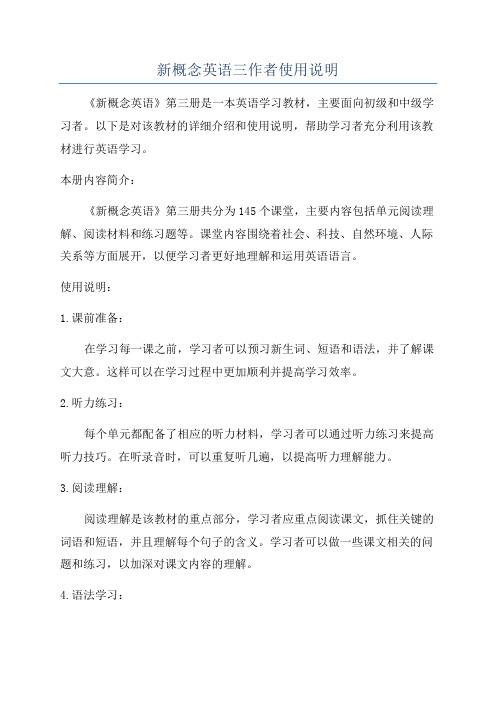
新概念英语三作者使用说明《新概念英语》第三册是一本英语学习教材,主要面向初级和中级学习者。
以下是对该教材的详细介绍和使用说明,帮助学习者充分利用该教材进行英语学习。
本册内容简介:《新概念英语》第三册共分为145个课堂,主要内容包括单元阅读理解、阅读材料和练习题等。
课堂内容围绕着社会、科技、自然环境、人际关系等方面展开,以便学习者更好地理解和运用英语语言。
使用说明:1.课前准备:在学习每一课之前,学习者可以预习新生词、短语和语法,并了解课文大意。
这样可以在学习过程中更加顺利并提高学习效率。
2.听力练习:每个单元都配备了相应的听力材料,学习者可以通过听力练习来提高听力技巧。
在听录音时,可以重复听几遍,以提高听力理解能力。
3.阅读理解:阅读理解是该教材的重点部分,学习者应重点阅读课文,抓住关键的词语和短语,并且理解每个句子的含义。
学习者可以做一些课文相关的问题和练习,以加深对课文内容的理解。
4.语法学习:通过阅读课文和练习题,学习者可以学习和巩固各种语法知识。
学习者应关注课文中的句子结构、时态、语态以及其他相关语法知识。
5.写作练习:学习者可以通过模仿课文写作,提高自己的写作水平。
可以尝试写一些类似课文的短文,巩固语言表达能力。
6.课后复习:在每个单元学习完之后,学习者应该进行复习,回顾所学过的语法、词汇和句子构造等。
可以通过做一些练习题或者小测验来查漏补缺,进一步巩固所学知识。
总之,学习《新概念英语》第三册需要持续的努力和耐心。
学习者应该积极参与课堂活动,多进行听力、口语、阅读和写作的练习,努力提高自己的英语能力。
同时,学习者应该合理安排学习时间,坚持不懈地进行学习,相信通过《新概念英语》的学习,你的英语水平将会有显著的提高。
新概念第三册重点汇总(超详细版)
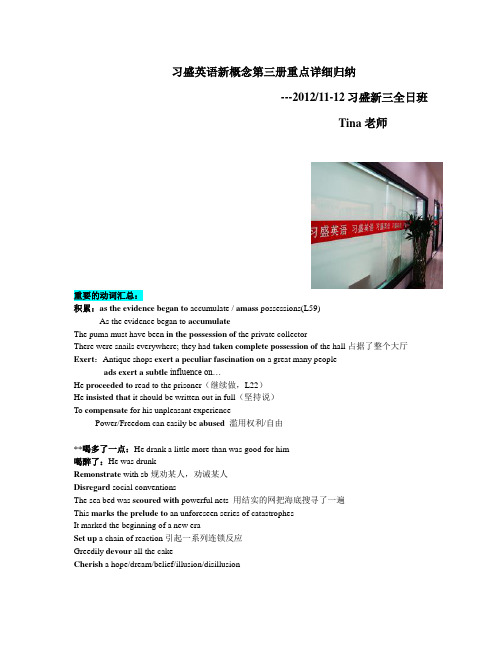
习盛英语新概念第三册重点详细归纳---2012/11-12习盛新三全日班Tina老师重要的动词汇总:积累:as the evidence began to accumulate / amass possessions(L59)As the evidence began to accumulateThe puma must have been in the possession of the private collectorThere were snails everywhere; they had taken complete possession of the hall占据了整个大厅Exert:Antique shops exert a peculiar fascination on a great many peopleads exert a subtle influence on…He proceeded to read to the prisoner(继续做,L22)He insisted that it should be written out in full(坚持说)To compensate for his unpleasant experiencePower/Freedom can easily be abused滥用权利/自由**喝多了一点:He drank a little more than was good for him喝醉了:He was drunkRemonstrate with sb规劝某人,劝诫某人Disregard social conventionsThe sea bed was scoured with powerful nets 用结实的网把海底搜寻了一遍This marks the prelude to an unforeseen series of catastrophesIt marked the beginning of a new eraSet up a chain of reaction引起一系列连锁反应Greedily devour all the cakeCherish a hope/dream/belief/illusion/disillusion**The experts confirmed that a puma will not attack a human being unless it is cornered The experts now were fully convinced that the animal was a pumaSomebody claims that…某人声称。
新概念英语第三册重点学习内容介绍
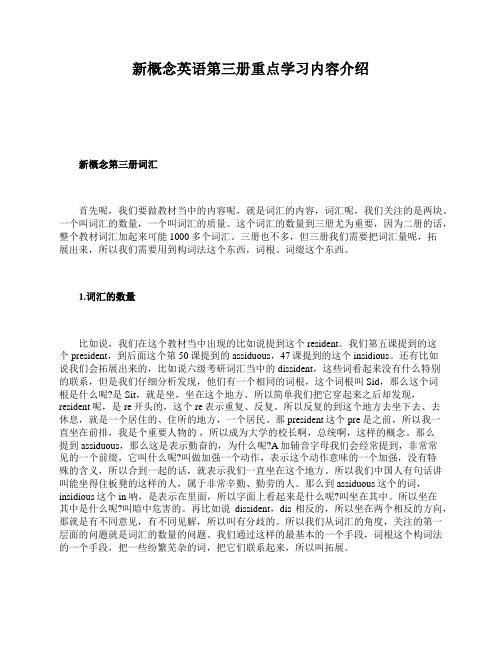
新概念英语第三册重点学习内容介绍新概念第三册词汇首先呢,我们要做教材当中的内容呢,就是词汇的内容,词汇呢,我们关注的是两块。
一个叫词汇的数量,一个叫词汇的质量。
这个词汇的数量到三册尤为重要,因为二册的话,整个教材词汇加起来可能1000多个词汇。
三册也不多,但三册我们需要把词汇量呢,拓展出来,所以我们需要用到构词法这个东西,词根、词缀这个东西。
1.词汇的数量比如说,我们在这个教材当中出现的比如说提到这个resident。
我们第五课提到的这个president,到后面这个第50课提到的assiduous,47课提到的这个insidious。
还有比如说我们会拓展出来的,比如说六级考研词汇当中的dissident,这些词看起来没有什么特别的联系,但是我们仔细分析发现,他们有一个相同的词根,这个词根叫Sid,那么这个词根是什么呢?是Sit,就是坐,坐在这个地方。
所以简单我们把它穿起来之后却发现,resident呢,是re开头的,这个re表示重复、反复。
所以反复的到这个地方去坐下去、去休息,就是一个居住的、住所的地方,一个居民。
那president这个pre是之前,所以我一直坐在前排,我是个重要人物的,所以成为大学的校长啊,总统啊,这样的概念。
那么提到assiduous,那么这是表示勤奋的,为什么呢?A加辅音字母我们会经常提到,非常常见的一个前缀,它叫什么呢?叫做加强一个动作,表示这个动作意味的一个加强,没有特殊的含义,所以合到一起的话,就表示我们一直坐在这个地方。
所以我们中国人有句话讲叫能坐得住板凳的这样的人,属于非常辛勤、勤劳的人。
那么到assiduous这个的词,insidious这个in呐,是表示在里面,所以字面上看起来是什么呢?叫坐在其中。
所以坐在其中是什么呢?叫暗中危害的。
再比如说dissident,dis相反的,所以坐在两个相反的方向,那就是有不同意见,有不同见解,所以叫有分歧的。
所以我们从词汇的角度,关注的第一层面的问题就是词汇的数量的问题。
新概念英语第三册精选必背文章

新概念英语第三册精选必背文章《新概念英语》是我国引进外国教材比较成功的一种,尤其第三册(技能的培养)部分,句型集中,词汇丰富,用法新颖。
下面是店铺带来的新概念英语第三册精选必背文章,欢迎阅读!新概念英语第三册精选必背文章1The process of ageing衰老过程At the age of twelve years, the human body is at its most vigorous. It has yet to reach its full size and strength, and its owner his or her full intelligence; but at this age the likelihood of death is least. Earlier, we were infants and young children, and consequently more vulnerable; later, we shall undergo a progressive loss of our vigour and resistance which, though imperceptible at first, will finally become so steep that we can live no longer, however well we look after ourselves, and however well society, and our doctors, look after us. This decline in vigour with the passing of time is called ageing. It is one of the most unpleasant discoveries which we all make that we must decline in this way, that if we escape wars, accidents and diseases we shall eventually ‘die of old age’, and that this happens at a rate which differs little from person to person, so that there are heavy odds in favour of our dying between the ages of sixty-five and eighty. Some of us will die sooner, a few will live longer----on into a ninth or tenth decade. But the chances are against it, and there is a virtual limit on how long we can hope to remain alive, however lucky and robust we are.Normal people tend to forget this process unless and until they are reminded of it. We are so familiar with the fact that man ages, that people have for years assumed that the process of losing vigour with time, of becoming more likely to die the olderwe get, was something self-evident, like the cooling of a hot kettle or the wearing-out of a pair of shoes. They have also assumed that all animals, and probably other organisms such as trees, or even the universe itself, must in the nature of things ‘wear out’. Most animals we commonly observe do in fact age as we do, if given the chance to live long enough; and mechanical systems like a wound watch, or the sun, do in fact run out of energy in accordance with the second law of thermodynamics (whether the whole universe does so is a moot point at present). But these are not analogous to what happens when man ages. A run-down watch is still a watch and can be rewound. An old watch, by contrast, becomes so worn and unreliable that it eventually is not worth mending. But a watch could never repair itself----it does not consist of living parts, only of metal, which wears away by friction. We could, at one time, repair ourselves----well enough, at least, to overcome all but the most instantly fatal illnesses and accidents. Between twelve and eighty years we gradually lose this power; an illness which at twelve would knock us over, at eighty can knock us out, and into our grave. If we could stay as vigorous as we are at twelve, it would take about 700 years for half of us to die, and another 700 for the survivors to be reduced by half again.人体在12岁时是生命力最旺盛的时期。
新概念第三册讲解及笔记

Lesson 01 A Puma at large 逃遁的美洲狮New words and expression 生词和短语学习词汇时仅知道汉语语义是不够的,要把单词放在语句中体会其应用学习关键句结构是则要把它放在段落结构或文章里puma n.美洲狮spot v.看出, 发现??= see, pick out, recognize, catch sight of 强调结果, 辨别出, 看见, 识别, 发现-- A tall man is easy to spot in the crowd.-- He has good eye for spotting mistakes.同意词:-- find:强调发现的结果/ find?out:查出事实真相-- discover:做出重大发现/ notice:注意到-- observe:观察/ watch:观察活动中的人或画面Spot n.斑点-- There is a white spot on the shirt.on the spot 有两个含义:1> 立刻, 马上(at?once, immediately)-- Anyone breaking the rules will be asked to leave on the spot. 2> at?the?place?of?the?action 在现场-- Wherever she is needed, she is quickly on the spot.Evidence n.证据(不可数名词)Evident adj.明显的, 显然的/ evidently adv.明显地, 显然Evidence = proof (n.证据)-- When the police arrived, he had already destroyed the evidence.in?evidence 显而易见的-- He was in evidence at the party.Accumulate v.积累, 积聚(强调积累的过程)-- As the evidence accumulates, experts from the zoo felt obliged to investigate.Gather vt.聚集, 把某人召集在某处-- The teacher gathered his students in the classCollect vt.搜集, 采集-- Do you collect stamps? Y es, I collect stamps as my hobby.(n.业余爱好)Assemble v.集合, 集会/ 装配-- A large number of people assemble on the square.Hoard vt.大量的储存(-- hoard?up = store?up 储藏)-- The squirrel hoards up nuts for the cold winter (squirrel n.松鼠)nut n.坚果)amass vt.积聚(主要用于诗歌和文学作品)-- The clouds amassed above the hillsOblige v.使…感到必须feel?obliged?to?do?sth 感觉有必要做某事-- I feel obliged to say no to his demand(n.要求, 需要)be?obliged?to?do?sth 被迫做某事-- They were obliged to sell their car to pay their debts off.(debt n.债务)hunt v.n.追猎, 寻找(hunt for)-- The experts from London zoo began to hunt (v.) for a puma.-- The hunt (n.) for the puma proved the difficult. (prove vt.证明, 证实)search 搜寻某处为了寻找到某人或某物-- The police were searching the forest for the missing boy.run?after 强调追赶, 追求-- look, a dog is running after a cat-- what are you run after in your lifeseek = pursue? v.追寻(理想)chase v.追赶(-- They are chasing a thief / They are running after a thief)blackberry n.黑莓/ berry n.浆果human?being 人类corner v.使走投无路, 使陷入困境作为动词, 经常使用被动语态-- The thief was cornered at last-- The problem cornered me.corner n.角落-- at the corner of the street-- in the corner of the room-- on the corner of the deskTrail n.一串, 一系列trail vt. 跟踪, 追踪(= follow)-- The police trailed the criminal to the place where he was hiding (criminal n.罪犯)Print n.印痕Cling v.粘(clung, clung, clinging)-- She is always clinging to her mother.-- He clung to the hope that he would succeed. 他怀有成功的希望stick? v.粘住(-- stick the envelop)n.信封stick?to?坚持(-- stick to the plan / stick to one’s promise)n.许诺sticky? adj.粘的(-- sticky fingers)convince v.使…信服1>convince sb of sth-- I convince him of my honesty.(n.诚实, 正直)我使他相信我的诚实。
新概念英语第三册课文重点精讲解析Lesson1~3

【导语】新概念系列教材的经典早已不⾔⽽喻。
其⽂章短⼩精悍,语句幽默诙谐,语法全⾯系统,历来被公认为是适合⼤多数中学⽣课外学习的资料之⼀。
为您整理了以下内容,仅供参考。
希望可以帮助到您!如果您想要了解更多相关内容,欢迎关注!新概念英语第三册课⽂重点精讲解析Lesson1 at large:逃遁的,没有被控制的 详细地(in detail) 总体来讲(as a whole) 在英⽂的表达⽅式中,⾸先呈现给读者的是结果 写议论⽂的时候要注意把握观点 Pandas are large cat-like animals which are found in Asia. life-like: 栩栩如⽣的 ⼀般来讲定语从句和同位语从句紧随在被修缮名词后⾯,但为了保持句⼦平衡,也可以把谓语动词放到从句之前 定语从句只是对于被修缮词的补充说明、修缮; 同位语从句则是讲述被修饰名词的内容 定语从句的引导词: 指⼈:主语who; 宾语who/whom; 定语 whose 表达事物:that(也可以指⼈)/which 时间状语:when; 地点状语:where; 原因状语:why 同位语从句:名词做主语、宾语等,关系词⽤that⽽不是which 时间-when; 地点-where An idea came to her that she might do the experiment in another way. I have no idea what has happened to him。
定语从句中没有what这个关系词,但它可以引导同位语从句 take sth.seriously :deal with sth.seriously take sth.lightly as: 随着 过去分词做定语 声称曾经做过某事:claim to have done sth. I still remember the school where I studied English. confirm: be sure,be certain search=hunt 把某物留在后⾯:leave behind 英⽂的表达⽅式重点在于突出客观事实,⽽中⽂则善于运⽤动作的执⾏者 complain of /about 抱怨 on + 名词:强调动作正在进⾏ on the rise :在上升 on the increase: 在增加 on the watch: 在观看 on the match: 在⽐赛中 on the fishing trip: 在钓鱼的途中 on holiday: 在度假 fully: completely,entirely in the possession of sb.=in sb.'s possession 归某⼈所有 in possession of sth. 拥有某物 take possession of 拥有 The beautiful car is in my possession/in the possession of me I am in possession of the beautiful car The person in possession of the big house is excited. It is disturbing to think that... 熟读并背诵第⼀⾃然段 at large take something seriously cling to leave behind complain of in the possession of/in possession of feel obliged to investigate a woman picking blackberries a businessman on fishing trip go on for several weeks in the quiet countryside新概念英语第三册课⽂重点精讲解析Lesson2 现在进⾏时和always等频度副词的搭配——表⽰说话⼈带有的情感⾊彩 Tome is always doing homework. Tom always does his homework. He is always making noises. one or another: 表⽰某种,这样或那样 I have to get enough money to have my house repaired have the church clock repaired——have something done 找某⼈来做某事 have the plane repaired have hair cut 某⼈所遭受到的意外某种情况——主语必须是发出动作的⼈ His wallet was stolen. He had his wallet stolen. used to:过去常常做,⽽现在不再发⽣的事情了 He used to smoke every day. however——⽤于⼝语,主要⽤于句⾸,作⽂中,⽤在句中、句尾,要⽤逗号分隔开来 He said that it was so,he was mistaken,however He said that it was so,however,he was mistaken. I know his story,however,I wouldn't like to tell you. I know his story,I,however,wouldn't like to tell you nevertheless nonetheless start: 惊跳,惊奇 before:...才 Armed with a torch... 现在分词和过去分词的⽤法 looking 分词做状语/定语的时候,⼀定要注意它和逻辑主语要呼应⼀致 in the torchlight ⾮正式⽤语中whom可以省略掉 recognized somebody as: 认出某⼈是 regard somebody as,think of somebody as,treat somebody as,have on somebody as whatever: ever⽤来加强语⽓ night after night: ⼀夜连着⼀夜 day after day year after year week after week bus after bus did 肯定句中常⽤do,did,does加强语⽓和情感⾊彩,⼀定要位于动词原形之前as well ⽤在句尾相当于to,主要⽤于肯定句中,但⽐to所表达的语意更优秀 stil⽤于句⾸,⽤逗号分隔开来——表达⼀个转折的关系:虽然如此,但是get used to,be used to,be accustomed to,get accustomed to 都表⽰习惯于 get强调渐近的过程, be强调习惯了的状态。
新概念英语第三册语法精粹:从句的使用

新概念英语第三册语法精粹:从句的使用新概念英语一共144课。
整本书无论是语法还是词汇,题材还是语句,都有其出彩之处。
今天我给大家带来新概念英语第三册语法精粹,希望可以帮助到大家,下面我就和大家分享,来欣赏一下吧。
新概念英语第三册语法精粹:从句的使用在英语中,从句主要有定语从句,状语从句和名词性从句(主语从句,宾语从句,表语从句,同位语从句)一.定语从句1. 定语从句:由关系代词who, whom, whose, that, which; 关系副词when, where, why 引导。
(下面十个句子请读5遍并脱口译出!)1. The death notices tell us about people who have died during the week.2. The man (whom) you spoke to just now is my friend.3. The building whose lights are on is beautiful.4. Please find a place which we can have a private talk in.5. The knee is the joint where the thighbone meets the large bone of the lower leg.6. He still remembers the day when he went to school.7. It is no need telling us the reason why you didnt finish it in time.8. He has three sons, two of whom died in the war.9. Mr. Smith, whose wife is a clerk, teaches us English.10. In the Sunday paper there are comics, which children enjoy.2. 只能用that和who引导的定语从句A.all, nothing, anything, a few, one做先行词指物时B.先行词前有形容词级修饰时,后面常跟that而不是which.C.先行词前有the only, the first, the last, the next, the very等词修饰时,引导词只能用that。
新概念英语第三册课文重点精讲解析Lesson34~36

【导语】新概念英语作为家喻户晓的经典之作,它有着全新的教学理念,有趣的课⽂内容及其全⾯的技能训练,为⼴⼤的英语学习者提供帮助!如果你也想学好英语,⼜怎能错过新概念英语?下⾯为您提供了相关内容,希望对您有所帮助!新概念英语第三册课⽂重点精讲解析Lesson34 1.Antique shops exert a peculiar fascination on a great many people. exert a peculiar fascination on sb:对某⼈有⼀种特殊的魅⼒ Ex: Antique shops appeal to a great many people. Shoe shops exert a peculiar fascination on a great many ladies. 2.The more expensive kind of antique shop where rare objects are beautifully displayed in glass cases to keep them free from dust is usually a forbidding place. 句型分析 句⼦的主⼲为:The more expensive kind of antique shop is usually a forbidding place. Where引导的定语从句修饰antique shop Rare objects:⽂物,稀有物品,可以⽤Rarity代替 Keep sb /sth free from :使不受......(影响,危害等) Ex: You can't keep yourselves free from anxieties like tramps. We put our books in bookcase to keep them free from dust. 3.But no one has to muster up courage to enter a less pretentious antique shop. muster up courage to :⿎起勇⽓... 4.There is always hope that in its labyrinth of musty, dark, disordered rooms a real rarity will be found amongst the piles of assorted junk that little the floors. 此句为新概念3之经典句型99句之⼀,建议背诵运⽤ There is always hope that ......总有希望... We cherish the hope that ......本句中的cherish意思是"抱有、怀有(希望、想法、感情)",相当于英语"keep (hope, feelings, love, etc.) in mind deeply and with strongly favorable feelings",这是cherish的常⽤意义 Ex: You must cherish the hope that one day you will be amply rewarded. 5.No one discovers a rarity by chance. By chance / by accident:偶然地,偶尔地 6.A truly dedicated bargain hunter must have patience, and above all, the ability to recognize the worth of something when he sees it. dedicated : concentrated above all : most important of all 最重要的是;承上启下,⽤来加强语⽓ The ability to do something ...的能⼒ 7.To do this, he must be at least as knowledgeable as the dealer. to do this : in order to discover a rarity 8.Like a scientist bent on making a discovery, he must cherish the hope that one dayhe will be amply rewarded. bent on / upon : 决⼼于,adj.短语作定语修饰scientist Ex: He is bent on winning the game. He is bent on becoming a bridge player. 近义表达 be bent on doing sth / be determined on doing sth / be devoted to / be engaged in 9.He has often des cribed to me how he picked up a masterpiece for a mere $50. for :花费 A mere : only 10.He found a great deal to interest him. He found a lot of interesting things. 这2个句型要求背诵 11.The morning passed rapidly and Frank was about to leave when he noticed a large packing case lying on the floor. be about to do sth:将要,正打算 be about to ...when ( /at the moment ).......:表⽰正要或刚要⼲什么,突然 Ex: I was about to leave when the telephone rang. He was about to lock door when his friend visited him. 12.The morning passed rapidly and Frank just come in, but that he could not be bothered to open it. bother : trouble打扰 Don't bother / trouble to come here tomorrow. I would not like to be bothered / troubled by you every day. ⽐较 disturb语⽓更为强烈,⼜指⼼烦意乱的⼼理状态,有时也指严重的精神错乱 The news has disturbed me very much. It is disturbing to think that a wild animal is still at large in the quiet countryside . trouble在含义上介于disturb / bother之间 13.Apart from an interesting-looking carved dagger, the box was full of crockery, much of it broken. Apart from ......除...之外,还有 =In addition to =Except Ex: Apart from a slight headache , I feel all right now. 14.the box was full of crockery, and much of it broken. 独⽴主格结构查阅HJ英语语法⼤全在线词典 Ex: Dish is done , he begged his wife not to sweep the floor. She ran into the room , her face covered with tears. He lay in bed , his face exposed. 15.Frank gently lifted the crockery out of the box an suddenly noticed a miniature painting at the bottom of the packing case. At the bottom of: 在底部 At the top of :在顶部 16.Frank could hardly conceal his excitement, for he knew that he had made a real discovery. conceal one's excitement 掩饰激动⼼情 make a real discovery 做出发现 17.The tiny painting proved to be an unknown masterpiece by Correggio and was worth hundreds of thousands of pounds. hundreds of thousands of ⼏⼗万新概念英语第三册课⽂重点精讲解析Lesson35 1.The word justice is usually associated with courts of law. be associated with = be connected with , be related to : 与...相联系 2.We might say that justice has been done when a man's innocence or guilt has been proved beyond doubt. we might say that:我们也许会说(⼀种不太肯定的⼝⽓) Ex: We might say that justice has been done. beyond: prep.超出某种程度,限度,主要是和名词进⾏搭配 beyond doubt ⽆可怀疑 Ex: He has been proved to be innocent beyond doubt. Your beauty is beyond my des cription. 3.Justice is part of the complex machinery of the law. part of:部分,前⾯没有冠词 Ex:Only part of his story is true. ⽐较 parts of:⼏部分,若⼲部分 Parts of the log book were recognized. . Large parts of the house were destroyed in the fire. ⽆论是part of还是parts of后⾯都要带单数名词 4.Those who seek it, undertake an arduous journey and can never be sure that they will find it. 背诵句型 5.Judges, however wise or eminent, are human and can make mistakes. however = no matter how 背诵句型 6.There are rare instances when justice almost ceases to be an abstract concept. There are rare instances when:在极个别的情况下 Ex: There are rare instances when women are not equal to men. cease:(正式)彻底地停⽌,暗指动作的突然性 ⽐较 ceased to do:与动词不定式连⽤ His heart suddenly ceased to beat. stop:(⼴泛,不正式)不强调⽅式,只强调结果 The car suddenly stopped. 7.Reward or punishment are meted out quite independent of human interference. quite independent of human interference:形容词短语做定语,说明主句的状况 8.At such times, justice acts like a living force. at such times:在有的时候 9.When we use a phrase like 'it serves him right', we are, in part, admitting that a certain set of circumstances has enabled justice to act of its own accord. 句⼦分析 句⼦的主⼲:we are , in part , admitting that ... enabled sb. to do 使...能够做某事 of its own accord ⾃然⽽然的 10.When a thief was caught on the premises of large jewellery store on morning, the shop assistants must have found it impossible to resist the temptation to say 'it serves him right.' ...found it impossible to resist the temptation to say.. ⼀定忍不住说...(双否,背诵句型) He deserves it. / It serves him right.罪有应得 11.Towards midday, a girl heard a muffed cry coming from behind on of the walls. come from behind :从后⾯ Ex:He jumped from behind one of the trees. 12.As the cry was repeated several times, she ran to tell the manager who promptly rang up the fire brigade. promptly=immediately:马上 13.They located the right chimney by tapping at the walls and listening for the man's cries. located the right chimney:确定那个烟囱 by tapping at the walls and listening for the man's cries:注意and连接前后形式相⼀致 listen for : pay attention ,so as to be sure of hearing,表⽰集中注意⼒,等待听到某种声⾳ Ex: We are listening for the clock to announce the NewYear. I'm listening for your steps. 14.The sorry-looking, blackened figure that emerged, admitted at once that he had tried to break into the shop during the night but had got stuck in the chimney. emerged:出现(= came out , appeared) get stuck :被卡住新概念英语第三册课⽂重点精讲解析Lesson36 1.We have learnt to expect that trains will be punctual. 背诵句型 We have learnt to expect that... : 我们已经习惯于期盼...... 2.After years of conditioning, most of us have developed an unshakable faith in railway timetables. 背诵句型 developed an unshakable faith in :对......产⽣了......样的信念 Ex:I advise you not to put your faith in such a remedy. 3.Only an exceptionally heavy snow fall might temporarily dislocate railway services. 背诵句型 4.It is all too easy to blame the railway authorities when something does go wrong. too...to句型中,在too前出现了all, only, but, not等词的时候,to就有肯定意义 句⼦中It 为先⾏词,在句⼦中作形式主语,to blame...这⼀动词不定式短语在句⼦中作逻辑主语. ⽐较 too..to .. 太...以致不能做... does 为助动词,这⾥表⽰强调,意为"真的""的确" 5.The truth is that when mistakes occur, they are more likely to be ours than theirs. be likely to do 有可能 ... Ex: You are likely to get success if you work hard. It is likely that... It is likely that he arrived here in time. when 为从属连词,在 that引导的从句中引导⼀个时间状语从句 ours & theirs均为斜体,表强调. ours=our mistakes, theirs=their mistakes. 6.After consulting my railway timetable, I noted with satisfaction that there was an express train to Westhaven. After 后,直接使⽤分词短语,在句中作时间状语. Ex: After talking to you I always feel better. with satisfaction 满意地. 为介词"with+抽象名词"构成的短语结构, 作状语,修饰noted . 句中 that为关系连词,引导其后的宾语从句. 7.It went direct from my local station and the journey lasted a mere hour and seventeen minutes. direct from...to...:直接从...到... 8.When I boarded the train, I could not help noticing that a great many local people got on as well. At the time, this did not strike me as odd. could not help doing...禁不住做...其后接名词,代词,或动名词 Ex: Many poeple can't help admiring the picture when they look at it. strike sb as 给某⼈以......印象,使某⼈感到; as后⾯可以接分词、名词、形容词搭配连⽤。
新概念英语第三册语法详解和总结(带习题)
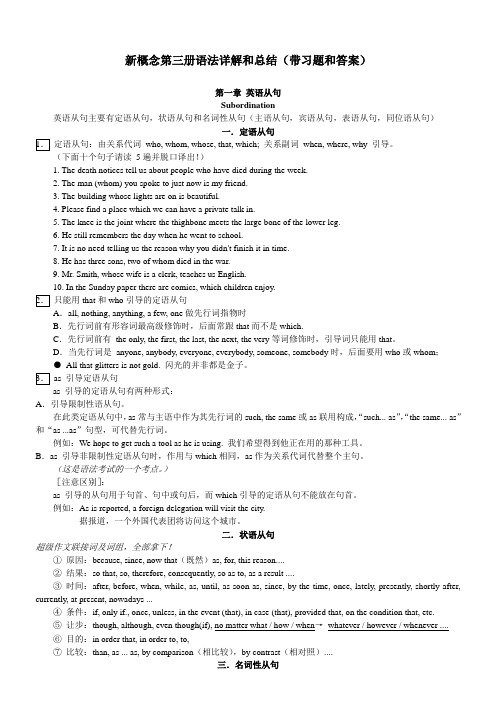
新概念第三册语法详解和总结(带习题和答案)第一章英语从句Subordination英语从句主要有定语从句,状语从句和名词性从句(主语从句,宾语从句,表语从句,同位语从句)一.定语从句定语从句:由关系代词who, whom, whose, that, which; 关系副词when, where, why 引导。
(下面十个句子请读5遍并脱口译出!)1. The death notices tell us about people who have died during the week.2. The man (whom) you spoke to just now is my friend.3. The building whose lights are on is beautiful.4. Please find a place which we can have a private talk in.5. The knee is the joint where the thighbone meets the large bone of the lower leg.6. He still remembers the day when he went to school.7. It is no need telling us the reason why you didn't finish it in time.8. He has three sons, two of whom died in the war.9. Mr. Smith, whose wife is a clerk, teaches us English.10. In the Sunday paper there are comics, which children enjoy.只能用that和who引导的定语从句A.all, nothing, anything, a few, one做先行词指物时B.先行词前有形容词最高级修饰时,后面常跟that而不是which.C.先行词前有the only, the first, the last, the next, the very等词修饰时,引导词只能用that。
新概念英语第三册
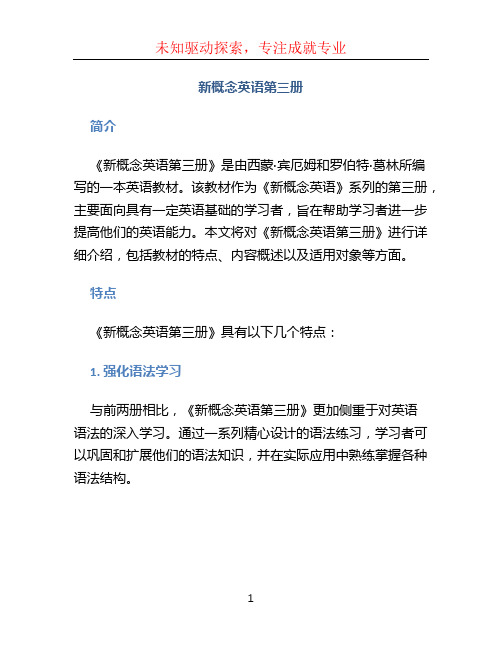
新概念英语第三册简介《新概念英语第三册》是由西蒙·宾厄姆和罗伯特·葛林所编写的一本英语教材。
该教材作为《新概念英语》系列的第三册,主要面向具有一定英语基础的学习者,旨在帮助学习者进一步提高他们的英语能力。
本文将对《新概念英语第三册》进行详细介绍,包括教材的特点、内容概述以及适用对象等方面。
特点《新概念英语第三册》具有以下几个特点:1. 强化语法学习与前两册相比,《新概念英语第三册》更加侧重于对英语语法的深入学习。
通过一系列精心设计的语法练习,学习者可以巩固和扩展他们的语法知识,并在实际应用中熟练掌握各种语法结构。
2. 提高阅读理解能力该教材通过丰富的阅读材料和相关练习,帮助学习者提高他们的阅读理解能力。
阅读材料覆盖了不同主题和难度级别,从而使学习者能够逐步提高他们的英语阅读水平。
3. 拓展词汇量《新概念英语第三册》通过大量的词汇练习和词汇任务,帮助学习者扩展他们的词汇量。
这些练习和任务旨在提高学习者对各种词汇的理解和运用能力,并增强他们的单词记忆能力。
内容概述《新概念英语第三册》共分为30个单元,每个单元包括了一篇短文和相关的学习活动。
以下是教材的概述:Unit 1-10这些单元主要介绍了一些基本的语法知识,例如动词的时态和语态,不定代词和介词等。
每个单元都包括了相关的例句和练习,帮助学习者巩固所学的内容。
Unit 11-20这些单元重点讲解了一些高级语法知识,如虚拟语气、间接引语和主谓一致性等。
学习者将通过这些单元的学习,掌握更复杂的语法结构,并能灵活运用于实际语境中。
Unit 21-30这些单元主要注重培养学习者的阅读理解能力。
每个单元都包含一篇阅读材料,并配有相关的问题和练习。
通过阅读不同主题和风格的文章,学习者将提高他们的阅读理解和批判性思维能力。
适用对象《新概念英语第三册》适合具有一定英语基础的学习者,特别是那些希望提高他们的语法、阅读和词汇能力的人群。
这本教材可以作为自学教材,也可以作为课堂教学的辅助教材。
- 1、下载文档前请自行甄别文档内容的完整性,平台不提供额外的编辑、内容补充、找答案等附加服务。
- 2、"仅部分预览"的文档,不可在线预览部分如存在完整性等问题,可反馈申请退款(可完整预览的文档不适用该条件!)。
- 3、如文档侵犯您的权益,请联系客服反馈,我们会尽快为您处理(人工客服工作时间:9:00-18:30)。
新概念英语第三册重点学习内容介绍
新概念第三册词汇
首先呢,我们要做教材当中的内容呢,就是词汇的内容,词汇呢,我们注重的是两块。
一个叫词汇的数量,一个叫词汇的质量。
这个词
汇的数量到三册尤为重要,因为二册的话,整个教材词汇加起来可能1000多个词汇。
三册也不多,但三册我们需要把词汇量呢,拓展出来,所以我们需要用到构词法这个东西,词根、词缀这个东西。
1.词汇的数量
比如说,我们在这个教材当中出现的比如说提到这个resident。
我们第五课提到的这个president,到后面这个第50课提到的assiduous,47课提到的这个insidious。
还有比如说我们会拓展出来的,比如说六级考研词汇当中的dissident,这些词看起来没有什么特别的联系,但是我们仔细分析发现,他们有一个相同的词根,这个词
根叫Sid,那么这个词根是什么呢?是Sit,就是坐,坐在这个地方。
所以简单我们把它穿起来之后却发现,resident呢,是re开头的,这个re表示重复、反复。
所以反复的到这个地方去坐下去、去休息,就
是一个居住的、住所的地方,一个居民。
那president这个pre是之前,所以我一直坐在前排,我是个重要人物的,所以成为大学的校长啊,总统啊,这样的概念。
那么提到assiduous,那么这是表示勤奋的,为什么呢?A加辅音字母我们会经常提到,非常常见的一个前缀,它叫
什么呢?叫做增强一个动作,表示这个动作意味的一个增强,没有特殊
的含义,所以合到一起的话,就表示我们一直坐在这个地方。
所以我
们中国人有句话讲叫能坐得住板凳的这样的人,属于非常辛勤、勤劳
的人。
那么到assiduous这个的词,insidious这个in呐,是表示在
里面,所以字面上看起来是什么呢?叫坐在其中。
所以坐在其中是什么呢?叫暗中危害的。
再比如说dissident,dis相反的,所以坐在两个
相反的方向,那就是有不同意见,有不同见解,所以叫有分歧的。
所
以我们从词汇的角度,注重的第一层面的问题就是词汇的数量的问题。
我们通过这样的最基本的一个手段,词根这个构词法的一个手段,把
一些纷繁芜杂的词,把它们联系起来,所以叫拓展。
2.词汇的质量
词汇的第二个层面的问题啊,我们这本书所注重的。
乍听起来好
象很简单,实际上是非常核心、非常重要的一块,就是词汇的质量。
什么叫词汇的质量呢?就这个词看起来简单,但你不一定能把它用出来。
我们指的用法呢,就是你能说出来,你能写出来的,你读到时候理解,这是一个非常关键的一个技能。
那我们举个最简单的例子,比如说很
多同学学三册之前都可能会翻我们这本书,比如说翻到第一课,去看
看这个《A Puma at large》,但看这课你自己看完之后啊,我不清楚
你有没有意识到如下这些问题。
我给他举几个例子,比如说,我们这
个第一课当提到的spot这个词,如果你光看咱们书上的解释叫做发现,你第一想法是它跟find发现有什么区别?也叫发现,你没有去注重这
个词本质的问题。
这个spot是什么意思呢?我们不会讲,先不说它英文解释是什么?也讲他和find有什么区别,我们进它最本质的一个概念。
它叫什么呢?我们举个例子,比如说第十课泰坦尼克号,这个当中讲到这个瞭望员呢,发现了冰山,翻译成中文叫什么呢?叫瞭望员一眼就看见冰山了,
这个在英语当中叫spot an iceberg。
基于这点我们会发现,这个
spot本身的这个意思是一个点,一个点,一个名词。
所以它表达那个
发现概念不是一般的发现,叫做点的发现,发现那么一个点。
所以我
们中国人说法的时候,一般并不一定出现发现这个字眼,或说什么呢,比如说我一出这个火车站,一眼就把我爸爸认出来了。
这个一眼认出来,英语是什么呢?其实就是一个词叫spot。
这个时候我们算是把这个词呢,理解到位把它用出来了。
你再比如说同样是第一课那个题目,很多同学都知道那个题目叫"A Puma at large"。
那个at large你知道叫逃遁的。
当你仔细问问你,你扪心自问。
中国人学了这么多年汉语,咱们讲母语、汉语,一
般来讲,我们会不会用逃遁这个字眼,很多用。
我估计,反正我讲这
么多年中文母语很少用逃遁这个字眼。
实际上我们中国人会怎么说话呢?你比如说我们会说这个犯罪分子当前还在逃,说谁谁当前还逍遥法外。
我们到当前为止还没逮着谁谁,这个翻译成我们中文的时候,用
我们中国话去讲的时候,听起来纷繁芜杂,落到英语其实就一个短语,就谁呢at large。
那你背短语的时候你背诵at large,逃遁的,往往
有时候意义不大,因为你没有把它用活,这是我们所讲词汇质量的问题。
就是看似简单,但是能不能把它用活这个个关键性的问题。
好,词汇我们大致讲这样一个部分,两大块。
除了这块之后呢,是
一个语法。
但是呢,因为现在二册呢已经把这个语法框架啊,非常非
常明确地打造出来了,是一个非常夯实的这样语法的基础。
所以三册
再去提语法的时候,往往是对语法的一个进一步的深入的理解,或者
是帮大家去查漏补缺。
有的时候往往这个东西你已经学过了,很系统
的东西你已经学过了。
很多的时候需要再去点播你一下,所以语法大
致是这样一个处理状态。
我们以后遇到的时候,我们会想起举例子去讲。
新概念第三册句型
1.基础句型
那么三册当中还有灵魂似的的东西。
也是我们这个60课,一共
60篇课文每一课当中一个灵魂性的这样的一个东西。
是什么呢?句型的意思。
什么叫句型的意思呢?举个简单的例子,你比如说,跟我们说一
句最简单的一句话,说这两个人呐,比如说这两个人理解8年才结婚,英语怎么说呢?想8年才结婚,我在教室里以前做过很多的这个测试,
发现很多同学啊,绝绝大部分同学遇到这个句子,在短时期内反映的
时候,经常是想到什么until、later、after大致这样一些表达。
但
很少有同学很迅速的,即时的反应出来这样的表示那就是They've known for 8 years before they got married.用到before这个连词。
那再举个例子,比如说他俩理解8天就结婚了,这个"就"怎么表达?还
是有很多同学想不到,又想到8 days later实际上也是这个结构,叫。
